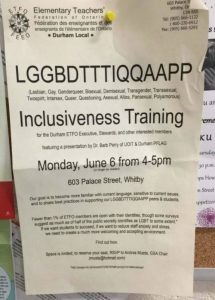(image via Reddit)
As advertised by the Elementary Teachers’ Federation of Ontario, but perhaps soon to make its way down to the states.
That’s lesbian, gay, genderqueer, bisexual, demisexual, transgender, transsexual, two-spirit, intersex, queer, questioning, asexual, allies, pansexual, polygamous.
The flyer says: “Our goal is to become more familiar with current language, sensitive to current issues, and to share best practices in supporting our LGGBDTTTIQQAAPP peers & students.”
That’s a lot to cover in one hour!
More. Andrew Sullivan blogs on LGGBDTTTIQQAAPPWHAT? and asks, “Is the gay-rights movement effectively over?” (second item):
For most of the straight people we need to engage, it feels like a near-parodic example of hair-splitting victimology and grievance-mongering. And to me, and many who once thought of ourselves as supporters of gay equality, it feels like an unpronounceable and impenetrable congeries of literally everything … and therefore nothing.
He adds:
My point is that a political movement makes sense in a liberal society because it advances certain policy proposals, and not because it spends its time constantly defining and redefining who is or who is not part of it, or sees itself as just one sliver of a broader movement dedicated to an ideology a very hefty chunk of the gay world simply doesn’t adhere to or believe in.

3 Comments for “Not a Parody”
posted by Tom Scharbach on
Oh, Canada. If you think this is strange, spend a few billion brain cells trying to wrap your head around Meech Lake. You won’t succeed, trust me.
posted by David Bauer on
SOGI is often used as shorthand, especially in terms of international law.
Fear not, Stephen, outside of your little comfortable bubble, schools pretend that gay history doesn’t exist, gay kids don’t exist and then go back to teaching creationism.
posted by Jorge on
The title strikes me more as an attempt to get the participants’ attention and get them in the room awake and wanting to participate, given that “LGGBDTTTIQQAAPP” is what government agencies are called upon to uphold and protect in a time when government discrimination based on sexual orientation and gender identity is banned.
For most of my time a common expression was “white, black, brown, or green/purple.” It’s the same principle, only less hypothetical.
But you are wrong in saying this kind of labeling could come to the states. Last year New York City Commission on Human Rights produced a card naming every possible gender identity it could think of in its campaign to educate the public about prohibited discrimination.
http://dailycaller.com/2016/05/24/new-york-city-lets-you-choose-from-31-different-gender-identities/
(Evidently the city is no longer maintaining the link to
the card)
Actually naming every single possible label that’s protected from discrimination is in my opinion not a very good idea even in educating the public or public employees because, to quote Mary Cheney on political campaigns and child rearing, you can’t make the list of rules long enough. “You can say, ‘Don’t run with scissors,’ and ‘Don’t cross the street without looking both ways,’ but there will always be something that’s not on the list, like ‘Don’t stick an eraser up your nose.'” It’s terribly important for the public and public employees to understand that D people are subject to anti-discrimination protection. Instead of making the commitment to teach the values and the principle of anti-discrimination, we try to make public policy stupid proof.
The result is passive-aggression by the very bad actors whose behavior and values you are trying to change. We saw that last year over the bathroom wars.